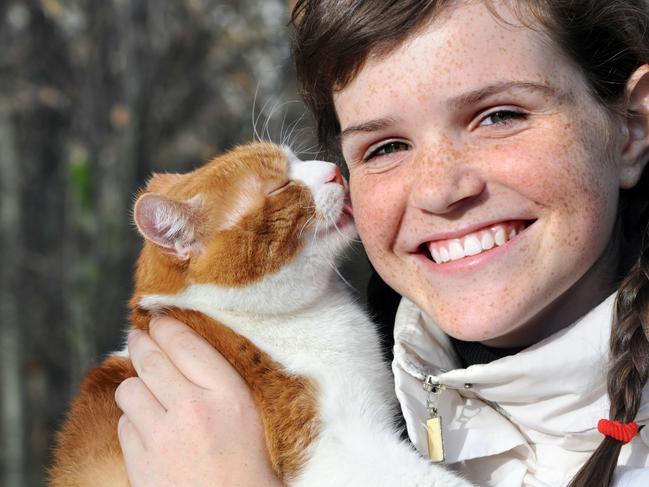This week: Why cats lick humans and feline epilepsy
Is it a sign of affection or that something is seriously wrong? Vet Dr Magdoline Awad explains why cats lick and talks about what to do if your cat has epilepsy.
SmartDaily
Don't miss out on the headlines from SmartDaily. Followed categories will be added to My News.
Of the more than 29 million pets in Australia, almost one-third are cats, according Animal Medicines Australia’s most recent national survey of pets and people.
It is little wonder our weekly vet columnist, Dr Magdoline Awad, chief veterinarian officer at Greencross The Pet Company, receives so many feline-related queries.
Here she explores an excessive licker and the realities of a cat suffering from epilepsy.
LICKY KITTY
We’re a household of five, two adults and three children, with a five-year-old cat. His name is Harold and for some reason, Harold always licks me but not my husband or kids. Can you explain this behaviour and should we be worried?
Cats may lick for a few reasons. We don’t really know why and this is one of the reasons cats are so mysterious. Licking may be one sign of showing you affection.

Harold may show affection to your partner and children in ways other than licking. Another reason could be that he likes the natural salts on your skin.
All individuals are slightly different, and he may just prefer you. Another explanation could be that this is a bonding behaviour, as cats like to groom each other when they feel comfortable.
CATCH UP ON DR MAGS’ PET ADVICE COLUMNS
Expert advice to deal with your pet’s disgusting habit
How pets should travel in cars
The life-threatening dangers of snail bait
What you need to know about your pet
Do you happen to be the one feeding him each day? If this is a new behaviour, and out of character, it might be worth getting him checked out by your local vet, as it could be the first signs of an underlying behavioural condition.
Please be careful if you are using any topical medications or creams, as Harold may be exposed to these while licking you and they may be toxic to him.
FELINE EPILEPSY
My cat who will be two on the October 8 has had epilepsy since August 9 last year. She is on medication Pexion and Phenomav. She is an indoor cat. Is there a cure for epilepsy? My son says that she will have that all her life. It is scary when she has a seizure.
Watching someone you know have a seizure is definitely scary so I know how you must feel when your cat has one. Epilepsy results from abnormal circuit activity in the brain. Epilepsy can be genetic or caused by conditions such as trauma, infectious disease, cancer or any abnormality of the brain.
In many cases, a cause is never found despite thorough investigation including blood tests and advanced imaging such as MRI. We call this idiopathic epilepsy. Given your cat has been diagnosed with epilepsy, having had repeated or multiple seizures, she would have had other causes of seizures ruled out such as toxins and metabolic problems.
Unfortunately, there is no treatment for your cat’s epilepsy except long term management using medications such as the ones your cat is currently taking. However, this doesn’t mean your cat will never have another seizure.
These medications lessen the severity and the frequency but can’t guarantee to stop seizures altogether. You will need to continue to provide your cat with regular veterinary checks as doses may need to be adjusted over time. It’s great that your cat is indoors only so that you can observe her closely.
HAVE A PET QUERY?
Email smartdaily@news.com.au

